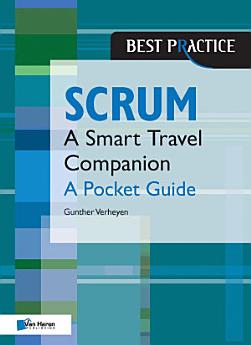Scrum - A Pocket Guide
অক্টো ২০১৩ · Van Haren
৪.৫star
১১ টা পৰ্যালোচনাreport
ইবুক
113
পৃষ্ঠা
family_home
যোগ্য
info
reportমূল্যাংকন আৰু পৰ্যালোচনা সত্যাপন কৰা হোৱা নাই অধিক জানক
এই ইবুকখনৰ বিষয়ে
This pocket guide is the one book to read for everyone who wants to learn about Scrum. The book covers all roles, rules and the main principles underpinning Scrum, and is based on the Scrum Guide Edition 2013. A broader context to this fundamental description of Scrum is given by describing the past and the future of Scrum. The author, Gunther Verheyen, has created a concise, yet complete and passionate reference about Scrum. The book demonstrates his core view that Scrum is about a journey, a journey of discovery and fun. He designed the book to be a helpful guide on that journey. Ken Schwaber, Scrum co-creator says that this book currently is the best available description of Scrum around. The book combines some rare characteristics: • It describes Scrum in its entirety, yet places it in a broader context (of past and future). • The author focuses on the subject, Scrum, in a way that it truly supports the reader. The book has a language and style in line with the philosophy of Scrum. • The book shows the playfulness of Scrum. David Starr and Ralph Jocham, Professional Scrum trainers and early agile adopters, say that this is the ultimate book to be advised as follow-up book to the students they teach Scrum to and to teams and managers of organizations that they coach Scrum to.
মূল্যাংকন আৰু পৰ্যালোচনাসমূহ
৪.৫
১১ টা পৰ্যালোচনা
এই ইবুকখনক মূল্যাংকন কৰক
আমাক আপোনাৰ মতামত জনাওক।
পঢ়াৰ নির্দেশাৱলী
স্মাৰ্টফ’ন আৰু টেবলেট
Android আৰু iPad/iPhoneৰ বাবে Google Play Books এপটো ইনষ্টল কৰক। ই স্বয়ংক্রিয়ভাৱে আপোনাৰ একাউণ্টৰ সৈতে ছিংক হয় আৰু আপুনি য'তে নাথাকক ত'তেই কোনো অডিঅ'বুক অনলাইন বা অফলাইনত শুনিবলৈ সুবিধা দিয়ে।
লেপটপ আৰু কম্পিউটাৰ
আপুনি কম্পিউটাৰৰ ৱেব ব্রাউজাৰ ব্যৱহাৰ কৰি Google Playত কিনা অডিঅ'বুকসমূহ শুনিব পাৰে।
ই-ৰীডাৰ আৰু অন্য ডিভাইচ
Kobo eReadersৰ দৰে ই-চিয়াঁহীৰ ডিভাইচসমূহত পঢ়িবলৈ, আপুনি এটা ফাইল ডাউনল’ড কৰি সেইটো আপোনাৰ ডিভাইচলৈ স্থানান্তৰণ কৰিব লাগিব। সমৰ্থিত ই-ৰিডাৰলৈ ফাইলটো কেনেকৈ স্থানান্তৰ কৰিব জানিবলৈ সহায় কেন্দ্ৰত থকা সবিশেষ নিৰ্দেশাৱলী চাওক।







